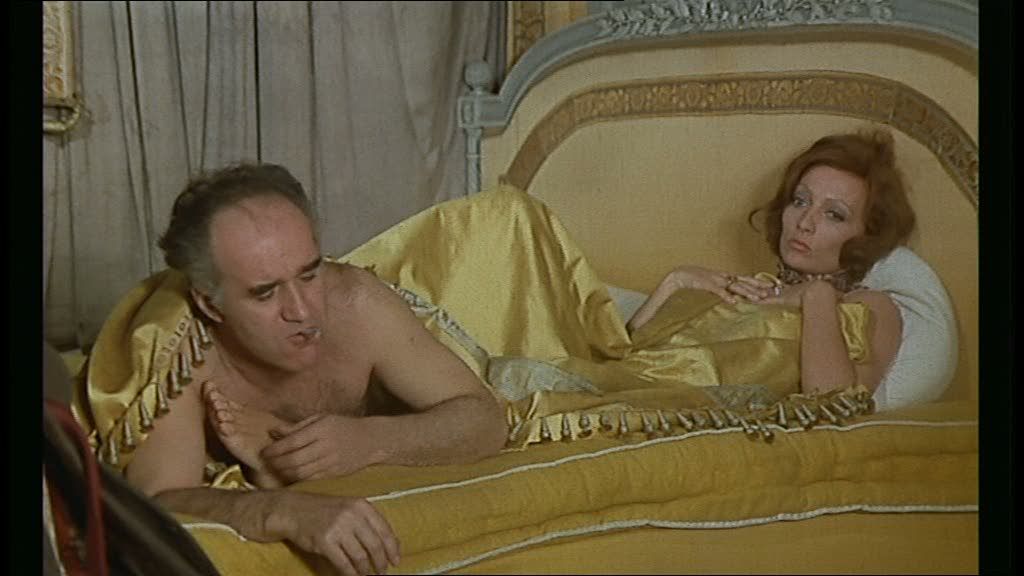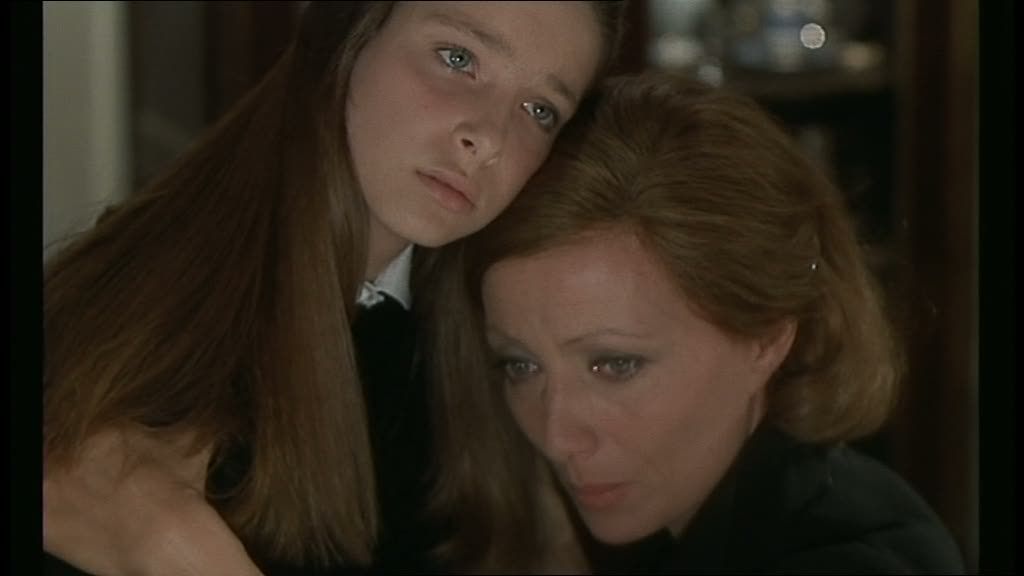
[This is a contribution to the Claude Chabrol Blog-a-Thon currently running at Flickhead from June 21 to June 30. For ten days, Flickhead will be dedicated to the works of the French New Wave master, and I'll be following along with many reviews of my own.]
To watch the films of Claude Chabrol is to become aware of the boredom and triviality of everyday life — and not just aware, but acutely sensitive, attuned to the daily, all too ordinary frustrations of strangled communication and deadened sensual impulses. His characters often seem to be sleepwalking, going through the motions, stoically living out clichés and genre conventions rather than thinking for themselves, acting for themselves, crafting a genuinely new and satisfying existence for themselves outside of the norm. Such is certainly the case with the central characters of Chabrol's Les noces rouges, who live out a generic tragedy and then, when it's all over, when everything has come to its predictable and devastating end, they admit that they never considered the alternatives, that it never even occurred to them that they could do anything else. Of course not; they are characters in a film that is, at least superficially, a thriller, and their actions are constrained by convention. Like puppets, they act out their predictable drama, murdering and deceiving in order to get what they think they want. This is all they can do. Chabrol's genius is to constrain his audience as well; it never occurs to us, watching the film, that there are any other possibilities, that there is anything outside the world we see onscreen. Thus the film's final lines are stunning in their anticlimactic brilliance, a shock to the system: you mean this didn't have to happen this way? Chabrol, for his part, delights in tricking us this way, but also despairs at the blindness and shortsightedness of those unwilling or unable to think for themselves.
The film's central couple is the small-town deputy mayor Pierre Maury (Michel Piccoli) and Lucienne Delamare (Stéphane Audran), the wife of his boss, the mayor Paul (Claude Piéplu). Pierre and Lucienne are desperately in love, or at least that's what they think. Actually, they hardly say a word to one another that isn't about sex or waiting for sex or planning to have sex. When they meet for a rendezvous, they rush at one another, violently pawing at each other's bodies, mashing their lips together, biting each other. They are passionate, nearly nymphomaniacal in their desires, and their love sessions are almost comical in the extremity of their lust. It's like watching a fierce bumper car battle between Piccoli's slightly bulky, barrel-like torso and Audran's slender, shapely frame. But for the sake of movie conventions, they're in love, and this is what love looks like, ungainly and unrestrained as it is.
Despite this passionate affair, Lucienne is held back by Paul, who is often out of town and interested only in his ambitions but nevertheless gets in the way of her complete happiness, while Pierre is held back by his sickly wife Clotilde (Clotilde Joano), a depressed and depressing woman who seems to be slowly fading away from the world by will. It's obvious what's in store, at least in the broadest sense. After all, what always happens in movies to those unlucky enough to be married to straying spouses? But Chabrol does not focus on the expected plotting and double-crossing and foul play. He's more interested in the substance of daily life. So he observes, in patient silence, the numbing dullness of Pierre and Clotilde's dinner table, as they sit quietly, slurping soup, not talking to one another. He observes too the nighttime activity at the Delamare home, where Lucienne and her daughter Hélène (Eliana de Santis) watch TV, the bluish light flickering over their stony faces and blankly staring eyes. Chabrol understands boredom, understands routine and disinterest and unthinking time-wasting. These moments of emptiness are an especially vivid contrast against the messy, emotional, awkward passion of Lucienne and Pierre's many trysts.

Chabrol, that old romantic at heart, seems to enjoy the goofy, childish pleasure that these two middle-aged burnouts take in one another; they'd both seemingly given up on life, gotten used to their own personal hells and settled in to simply exist, to survive from day to day. But when they're together they wake up, they have fun like teenagers. In the evenings, they sneak into a local chateau, a tourist destination during the day, and make love in the antique beds scattered about the premises, popping champagne bottles so that a shower of foamy bubbles sprays across the face of a priceless old painting. Later, when Pierre is at work as a member of the local government, he listens with an exaggeratedly innocent look on his face as several citizens complain about the "kids" who deface the chateau and use it as a meeting place for sexual trysts. Pierre and Lucienne are like kids together, enjoying themselves and each other, hiding naked in the bushes after one close call, giggling and cuddling together even as they recover from almost getting caught by a passing boat.
Of course, this idyll cannot last, and it is disturbed most thoroughly by Lucienne's husband Paul, a bizarre caricature of a pompous politician. Chabrol loves dealing with caricatures, with exaggerated types, with the ultimate example of a form he despises. Paul is every bit an overblown type rather than a full character, much like Jean Yanne's equally despicable Paul in Que la bête meure. He serves the same role as that earlier Paul, a convenient target for the main characters' hatred, a man drained of every ounce of decency. With his cackling, high-pitched voice and cheerful amorality, this Paul is strangely sinister, all the more frightening because he never lets his courteous, strenuously polite façade drop. He smiles and shakes hands and speaks about friendship and happiness, even as the subtext of his words carries a more subtle threat, a subdued and implied indication of the consequences for crossing him.
One interesting element of Chabrol's work is the way the same names recur again and again from film to film. The names Charles, Paul and Hélène weave all through his work of the late 60s and 70s, the names rotated and shuffled around into various configurations of husbands, wives, lovers, killers, victims. Les noces rouges introduces an interesting wrinkle into this conceit in that Stéphane Audran for once does not play the role of Hélène, the name she was almost always given in her films of this period for her then-husband Chabrol. Instead, the name passes on to the daughter of Audran's character, with whom Lucienne shares a strange, conspiratorial chemistry. When they're together around Paul, they smile slyly, as though sharing some secret together, privately making fun of Lucienne's husband (who isn't Hélène's father but her stepfather). There's also a stunning scene towards the denouement of the film in which mother and daughter mournfully place their heads together, accentuating the striking similarities between the two actresses, who really do look like they could be related. One senses that Hélène will grow up to be like her mother, discontented and unimaginative, still staring blankly at the TV. This generational continuity gives meaning to the shifting of names, Chabrol's eternal Hélène reincarnated in a younger form, the cycles of boredom and infidelity and violence and betrayal all starting anew. This impression is omnipresent in Chabrol's work: the paradox that while the cycles of bourgeois stupidity and violence are endless, escape would be simple if only one of these hopeless, dead-eyed people would make a different choice, would break the cycle, would stop thinking in such circumscribed terms.
Ed, I wanted to thank you for your amazing contributions to this blogathon. I haven't been able to read most of your posts yet (my schedule at work this week has been hectic), but I'm looking forward to pouring over each of them over the next few days.
ReplyDeleteI don't know how you're able to write such lengthy, substantial material so quickly, but I certainly envy you for it.
Thanks again!
Thanks a lot, Flickhead, I'm happy to contribute. I've really enjoyed the blog-a-thon so far: both watching and writing about so much Chabrol in such a concentrated period, and reading everything everyone else has to say. It's been a great event so far, with just a couple more days left. Nice job!
ReplyDelete